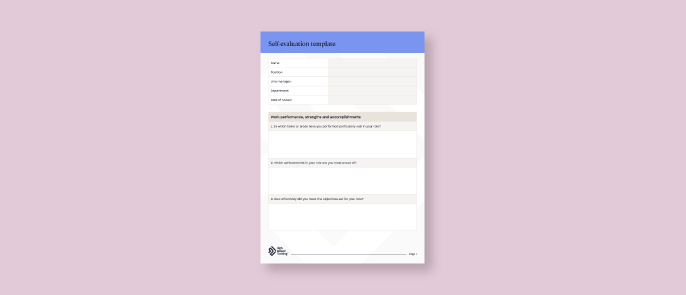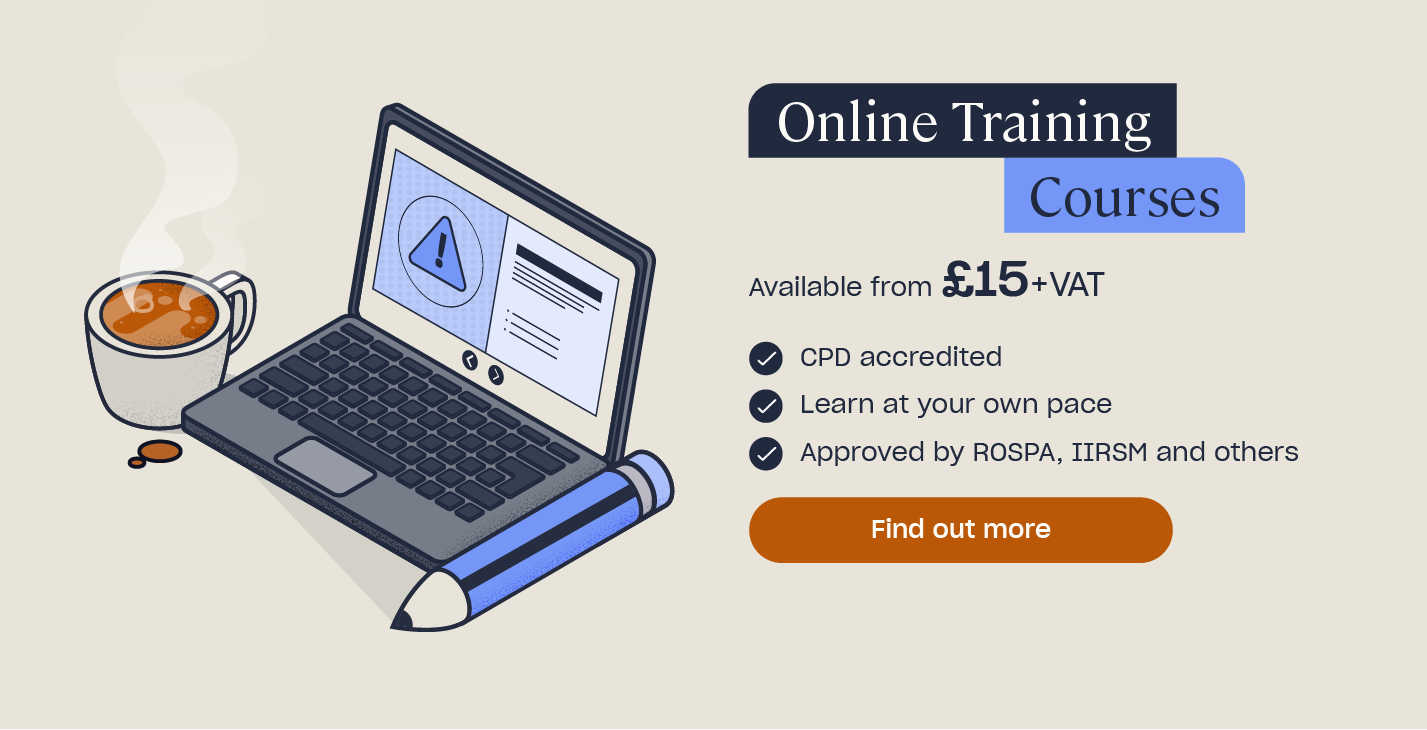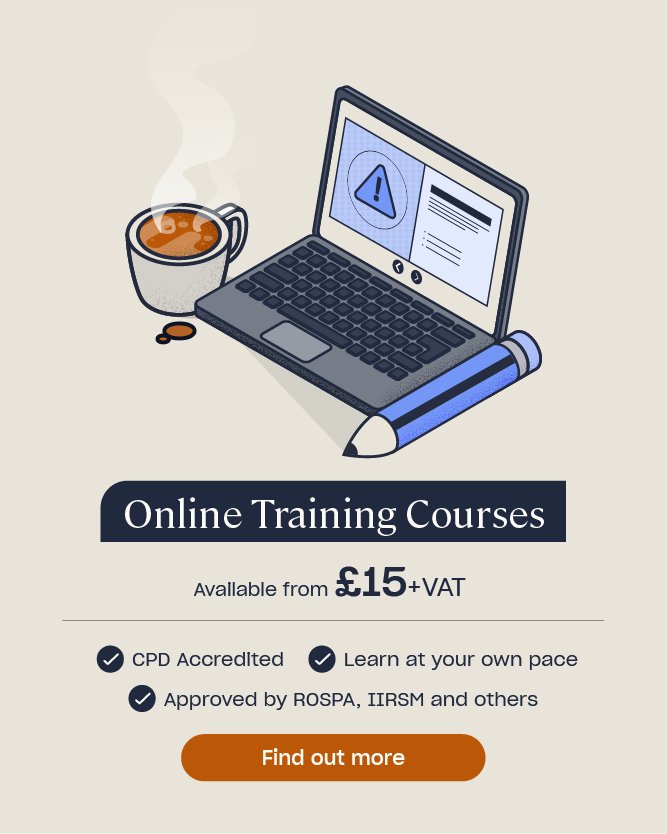How to Write a Self-Evaluation: Free Template
Personal and professional development are an important part of your career journey and there are many useful tools that you can use to help do this. Completing a self-evaluation can be highly beneficial when it comes to identifying your strengths and weaknesses at work, and it’s a great method for self-improvement in order to help you achieve a promotion or climb the career ladder. In this article, we’ll outline what self-evaluation involves, provide some self-evaluation questions to consider and give you a downloadable self-evaluation template to use.
What is a Self-Evaluation?
A self-evaluation, also known as a self-assessment, is when an employee considers their own strengths and weaknesses, contributions, challenges, goals and abilities in the workplace to evaluate how much progress they’ve made.
A self-evaluation contributes towards your personal development and goals for work, and often goes hand-in-hand with an annual performance review; many employers request that their employees fill out a self-evaluation ahead of the review meeting.

The purpose of doing a self-evaluation is to help you recognise your own progress, abilities and areas for improvement. Rather than having your manager tell you where you succeeded or went wrong over the year, it’s up to you to identify your own strengths and weaknesses.
If you’ve been with the same company for a few years, then you can also look back on previous self-evaluations to see how far you’ve come.
Self-Evaluation vs Self-Reflection
Self-evaluation and self-reflection are similar processes and both focus on personal development and growth. The key difference is that self-evaluation is used to analyse your workplace performance and think about it critically in order to identify areas for active improvement. In comparison, self-reflection is more about simply being aware of your strengths, abilities and weaknesses.
Importance of Self-Evaluation
Many companies, of all types and sizes, choose to use self-evaluation as part of their annual performance review process as it enables employees to feel more in control of their own development and encourages them to be involved in their progression at work.
For employees, self-evaluation is important because it enables you to:
- Be more engaged in the appraisal or performance review process.
- Feel more valued by your organisation.
- Have more ownership over your own development.
- Be more accountable for your successes and failures.
- Feel more confident in your strengths, abilities and achievements.
- Feel more motivated about the future of work.
- Identify what training or personal development tasks are best suited to you.
- Ensure you have written evidence of your achievements for when you want to apply for a promotion.

For managers and employers, self-evaluation is important because it:
- Gives employees more self-confidence about their abilities, leading to them being more productive and committed to the role.
- Makes employees more motivated, as they’re more empowered to choose their own goals and incentives.
- Helps employees to be more autonomous and in control of their own development, therefore increasing ownership, responsibility and initiative.
- Enables you to select the best tasks, training and support for each employee based on their specific identified strengths and weaknesses.
- Gives you an insight into how your employees truly feel about their role, workplace and team.
- Ensures the review process is a two-way discussion and avoids the employee not engaging or relying on you to tell them where to improve.
Questions for Self-Evaluation
There are many different types of questions that can be used when writing your self-evaluation depending on what you and your manager want to find out. The specific self-evaluation form you’re asked to complete will depend on your particular role and industry, but it will usually contain some standard categories in order to discover your strengths and weaknesses.
Consider the following categories of questions for self-evaluation:
Self-Evaluation Questions on Work Performance, Strengths and Accomplishments
- In which tasks or areas have you performed particularly well in your role?
- Which achievements in your role are you most proud of?
- How effectively did you meet the objectives set for your role?
- What were your key accomplishments within your team and the wider organisation?
- How have you contributed to the success of your team and your organisation?
- How have you demonstrated initiative within your role?
- How would you assess your overall performance since your last review?
- Have you made any notable improvements in your role since your previous evaluation?
Self-Evaluation Questions on Work Challenges and Weaknesses
- In which areas of your role do you feel you would benefit from more support?
- Were there any goals in your role you were unable to achieve? What were the obstacles?
- Have there been any aspects of your role where you struggled to perform at your best? What contributed to this?
- What specific challenges have you faced in your role, and how did you overcome them?
- What support or resources would enable you to perform more effectively in your role?
- Are there any barriers within your organisation that are preventing you from progressing?
- Do you have any under-used skills or knowledge that could contribute more to your team or role?

Self-Evaluation Questions on Growth and Development
- What could you do to improve areas of your role where you feel less confident?
- What skills or knowledge would you like to further develop?
- What learning or development opportunities would be most valuable for your role?
- How well do your current skills align with the requirements of your role?
- In which areas of your role do you feel further training would be helpful?
- How have you used feedback from your team or manager to improve your performance?
- What actions could you take to continue growing professionally within your organisation?
Self-Evaluation Questions on Job Satisfaction and Work Culture
- What do you most enjoy about your role in your team and organisation?
- Which aspects of your role do you find least satisfying, and why?
- What changes could be made to make your role more manageable or rewarding?
- Are there any parts of your role you would like to remove or delegate, and why?
- How well does your current role support your longer-term career aspirations within the organisation?
- Do you feel your behaviour aligns with your organisation’s expectations?
- How well do you understand and reflect your organisation’s core values in your day-to-day work?

Self-Evaluation Questions on Teamwork
- Have you built any notable professional relationships recently?
- How effectively do you communicate with your team members and other colleagues?
- Do you believe your approach to work positively contributes to your team’s morale?
- What are some examples of situations where you effectively collaborated with your team?
- What could you do to improve the way you collaborate with your team?
- Are there any sticking points in your team and what can be done to resolve them?
Self-Evaluation Questions on Goals and Career Aspirations
- What goals would you like to set for yourself in your current role?
- What career milestones are you aiming to reach over the next three years within your organisation?
- What professional achievements are you hoping to accomplish in the next year?
- What kind of support would help you successfully achieve these goals?
How to Write a Self-Evaluation
It doesn’t need to be daunting, difficult or overwhelming to write an effective self-evaluation. In fact, it can be quite a therapeutic and satisfying process to look back on the year gone by and identify all of your successes, highlights and achievements. To help you write a self-evaluation, follow our top tips:
- Determine the purpose of the self-evaluation – first ensure you know what the self-evaluation is intended for, whether a performance review, a promotion or a salary discussion, as this helps you to tailor your responses and tone appropriately.
- Revisit your job description – use your job description to evaluate where you’ve excelled, what’s been challenging and any areas you could develop further.
- Use the STAR method – structure your examples clearly following the STAR method: Situation, Task, Action and Result.
- Use data and metrics – back up your achievements with measurable results by including relevant figures.
- Highlight your accomplishments – detail your major achievements and explain the context, your role, the outcome and how it impacted your team or the business.
- Connect results to company goals – show how your efforts contributed to broader business objectives by aligning your achievements with company aims.
- Include external feedback – incorporate praise, recognition, testimonials and positive feedback from colleagues, clients, customers or managers.
- Maintain a positive tone – keep the tone positive and professional throughout: avoid criticising or blaming others or being negative about the company.
- Own your mistakes – be honest about mistakes or shortcomings and take ownership of what happened, what you learnt and how you plan to improve using SMART goals.
- Avoid comparing yourself to others – focus on your own progress and reflect on how far you’ve come since your last review, rather than comparing yourself to colleagues.
- Voice your ambitions – share your career goals, express your interest in taking on new challenges or qualifications and describe how your current role fits within your long-term plan. This helps your manager support your development with relevant opportunities.
- Request training and development – identify specific areas where further training could help your career progression, whether it’s a conference, online training course or mentorship programme.
- Proofread for spelling and grammar – before you press submit on your self-evaluation form, be sure to read it through. A well-written, error-free document shows attention to detail, professionalism and care.

Free Self-Evaluation Template
Use the link below to download our free self-evaluation template that you can use in your workplace. Whether you’re doing an annual performance review, an appraisal or a meeting about a promotion or pay rise, using a self-evaluation form can help make the process smoother and easier.
A self-evaluation form can be used to evaluate your year at work and identify your strengths, weaknesses, abilities, achievements and areas for improvement. To write an effective self-evaluation, use clear examples, highlight your achievements using relevant data, reflect honestly on challenges and align your contributions with your company’s goals and values. Using a self-evaluation template is a good way to ensure you capture all the key information.
Further Resources:
- Online Training Courses
- A Personal Development Plan (PDP) Guide & Template
- A Guide to 360 Degree Feedback: Free Template












